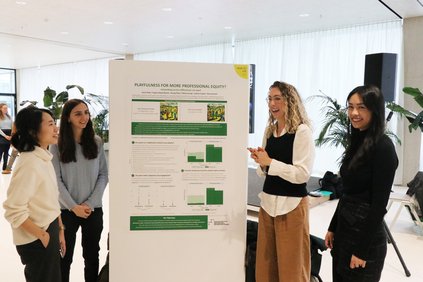Research - 13.12.2022 - 09:00
Environmentally aware employees drive innovation
Employees concerned about sustainability are normally highly engaged in their work environment. This is shown in a study by an international team of researchers led by Stephanie Rüegger and Maximilian Palmié from the University of St.Gallen (HSG).

Smiling female leader, coach holding briefing for multiracial team interns in office, teaching students, plan to subordinates. Businesswoman at company meeting with diverse colleagues.
Currently, little is known about the relationships between economic and environmental dimensions in the attitudes and behaviors of people in organizations. An analysis by researchers from HSG and other universities has addressed this issue and shows: Employees who live in an environmentally friendly way not only act as sustainability ambassadors in their companies but also increase their economic potential. An environmentally friendly lifestyle also has an impact on the work environment and encourages employees to propose and implement improvements in the workplace.
Paving the way for innovation in the company
Prof. Dr. Maximilian Palmié is an expert in sustainable innovation management at the University of St.Gallen (HSG). With his team, he has investigated whether the private environmental orientation of employees has an influence on the economic performance of their companies. "We consider in our research project that an employees' private environmental orientation influences not only their environmental and social behavior at work, but also their propensity to make suggestions for improvements." According to the study, making recommendations is not limited to environmental issues but also spurs innovation. “Green employees” not only make suggestions for saving paper, electricity or water, but also suggest improvements in product quality or services.
An environmentally friendly corporate philosophy spurs commitment
"Companies can encourage employees to share their ideas and opinions and actively incorporate them into the company processes," says Palmié. According to the study, the more sustainable a company is in the eyes of its employees, the more employee-driven suggestions lead to economic improvements in the workplace. "An analysis of 283 employees in the hospitality industry supports our theoretical account," the professor adds.
The benefits are already apparent in recruiting: by selecting "green employees," companies may have to invest less in developing a proactive work culture. Moreover, the fact that "green" employees are already engaged in improving the environment in their spare time may indicate that they are able and willing to identify valuable opportunities for improvement at work. Furthermore, the study suggests that employees' environmental orientation stimulates suggestions that go beyond efficiency. Therefore, private environmental orientation is important for the economic performance of the company.
Rewarding environmentally friendly attitudes
"Managers should reward and encourage an environmentally and people-friendly attitude. Often, employees with this attitude show themselves to be highly proactive, open to new experiences, conscientious and emotionally stable, even in the work context." Conversely, an attitude that prioritizes pure profit maximization for the company is rarely accompanied by a spirit of innovation and commitment.
Research method of the study
For the study, a survey of 283 employees of a large group of companies in the hospitality industry was statistically analyzed. It covered not only the administrative staff at the headquarters, but also service and kitchen staff at more than a dozen locations in Switzerland. The study is the first step in understanding the links between ecological or social attitudes and economically valuable employee behavior. "It will be exciting to study the influence of ecological and social attitudes on other economically desirable behaviors in the future," Palmié says.
The study was published in the Journal of Business Research and is available for download at the following link: doi.org/10.1016/j.jbusres.2022.113492
Image: Adobe Stock / fizkes
More articles from the same category
This could also be of interest to you
Discover our special topics
















